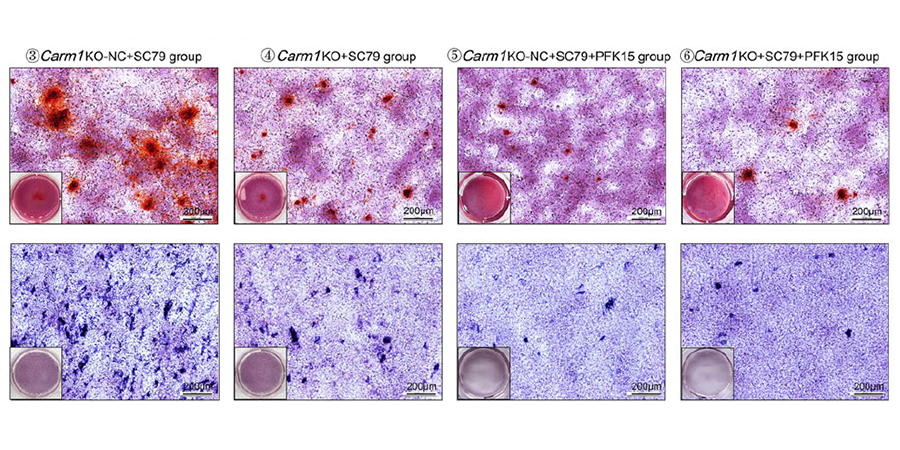SC 79 |
| Katalog-Nr.GC11645 |
SC 79 stimuliert die osmotische Phosphorylierung von Akt im Gehirn und unterbindet die Verlagerung der AKT-PH-Domäne.
Products are for research use only. Not for human use. We do not sell to patients.

Cas No.: 305834-79-1
Sample solution is provided at 25 µL, 10mM.
SC 79 is an activator of osmotic Akt phosphorylation in the brain and an inhibitor of AKT-PH domain translocation[1].
SC 79 enhances phosphorylation of all three Akt isotypes and enhances Akt activation in a variety of cell types[1]. Treatment of BRAT1 knockdown cells with Akt activator SC 79 can improve their proliferation and reduces mitochondrial ROS concentration[4]. In both SH-SY5Y cells and primary murine dopaminergic neurons, pre-treatment with SC 79 largely inhibited hydrogen peroxide (H2O2)-induced cell viability reduction, apoptosis and necrosis. SC 79 activated Akt in the neuronal cells, which was required for its neuroprotection against H2O2[5]. In primary murine osteoblasts and osteoblastic MC3T3-E1 cells, pretreatment with SC 79 significantly attenuated Dex-induced cell death. Further, Dex-induced mitochondrial permeability transition pore (mPTP) opening, cytochrome C release and apoptosis activation were dramatically alleviated with SC 79 pretreatment in above cells[6]. The protective role of SC 79 against H/R of hepatocytes or hepatic I/R injury is related to activation of phosphorylation of Akt, resulting in the decrease of pro-apoptotic protein of Bim, Bax, and Bad, and increase of the anti-apoptotic protein Bcl-2 and Bcl-xL induced by cell H/R and hepatic I/R injury[7].
SC 79 enhances Akt activity during neuronal cell death in an in vivo mouse model of ischemia, SC 79 attenuates stroke-induced neuron death[1]. SC 79 protects hepatocytes from apoptosis induced by agonistic anti-Fas antibody CH11 (for humans) or Jo2 (for mice) and significantly prolongs the survival of mice given a lethal dose of Jo2[2]. Akt activator SC 79 protects hepatocytes from TNF-α-induced apoptosis and protects mice from d-galactosamine (d-Gal)/lipopolysaccharide (LPS)-induced TNF-α-mediated liver injury and damage. SC 79 not only enhances the nuclear factor-κB (NF-κB) prosurvival signaling in response to TNF-α stimulation, but also increases the expression of cellular FLICE (FADD-like IL-1β-converting enzyme)-inhibitory protein L and S (FLIPL/S), which consequently inhibits the activation of procaspase-8[2].
References:
[1]: Jo H, Mondal S, et,al. Small molecule-induced cytosolic activation of protein kinase Akt rescues ischemia-elicited neuronal death. Proc Natl Acad Sci U S A. 2012 Jun 26;109(26):10581-6. doi: 10.1073/pnas.1202810109. Epub 2012 Jun 11. PMID: 22689977; PMCID: PMC3387065.
[2]: Liu W, Jing ZT, et,al. A Novel AKT Activator, SC79, Prevents Acute Hepatic Failure Induced by Fas-Mediated Apoptosis of Hepatocytes. Am J Pathol. 2018 May;188(5):1171-1182. doi: 10.1016/j.ajpath.2018.01.013. PMID: 29673487.
[3]: Jing ZT, Liu W, et,al. AKT activator SC79 protects hepatocytes from TNF-α-mediated apoptosis and alleviates d-Gal/LPS-induced liver injury. Am J Physiol Gastrointest Liver Physiol. 2019 Mar 1;316(3):G387-G396. doi: 10.1152/ajpgi.00350.2018. Epub 2019 Jan 10. PMID: 30629471.
[4]: So EY, Ouchi T. BRAT1 deficiency causes increased glucose metabolism and mitochondrial malfunction. BMC Cancer. 2014 Jul 29;14:548. doi: 10.1186/1471-2407-14-548. PMID: 25070371; PMCID: PMC4129107.
[5]: Xu Y, Gao YW, et,al. SC79 protects dopaminergic neurons from oxidative stress. Oncotarget. 2017 Dec 20;9(16):12639-12648. doi: 10.18632/oncotarget.23538. PMID: 29560097; PMCID: PMC5849161.
[6]: Li ST, Chen NN, et,al. SC79 rescues osteoblasts from dexamethasone though activating Akt-Nrf2 signaling. Biochem Biophys Res Commun. 2016 Oct 7;479(1):54-60. doi: 10.1016/j.bbrc.2016.09.027. Epub 2016 Sep 7. PMID: 27614310.
[7]: Zhou H, Yu Y,et,al. Protective Effects the Akt Activator SC79 in Hepatic Ischemia-Reperfusion Injury. Med Sci Monit. 2018 Jun 24;24:4346-4354. doi: 10.12659/MSM.911178. PMID: 29936516; PMCID: PMC6049012.
Average Rating: 5 (Based on Reviews and 22 reference(s) in Google Scholar.)
GLPBIO products are for RESEARCH USE ONLY. Please make sure your review or question is research based.
Required fields are marked with *









